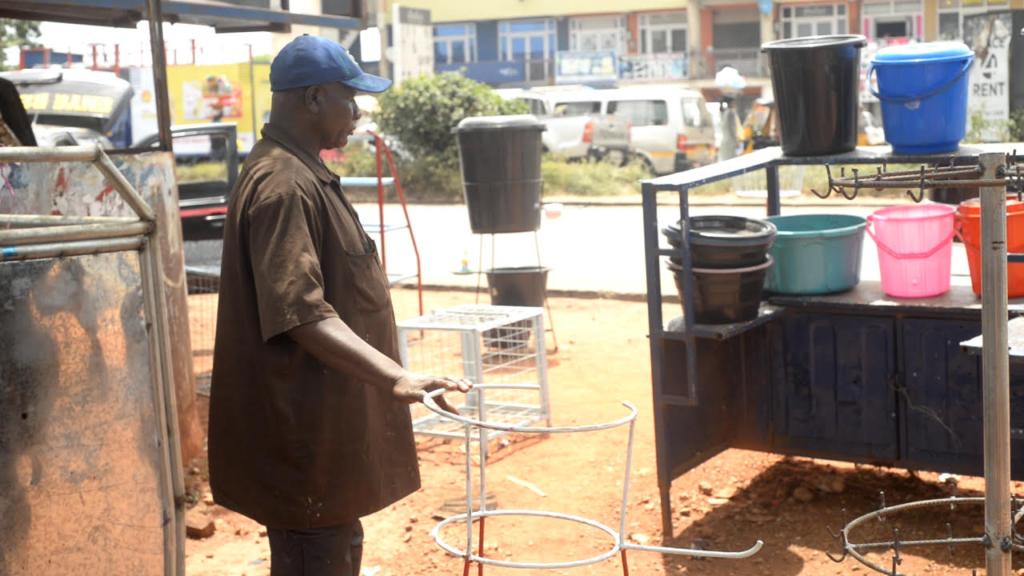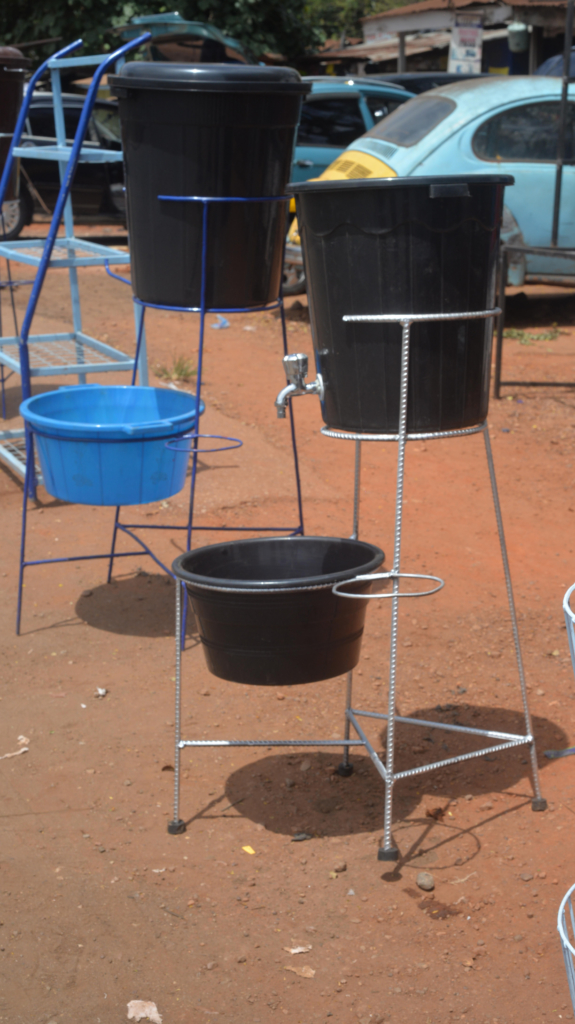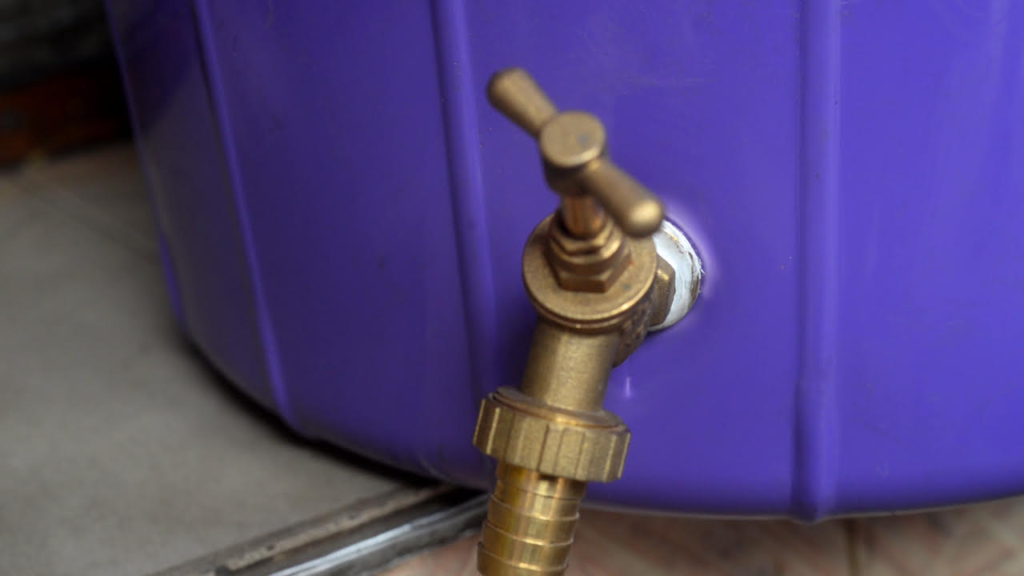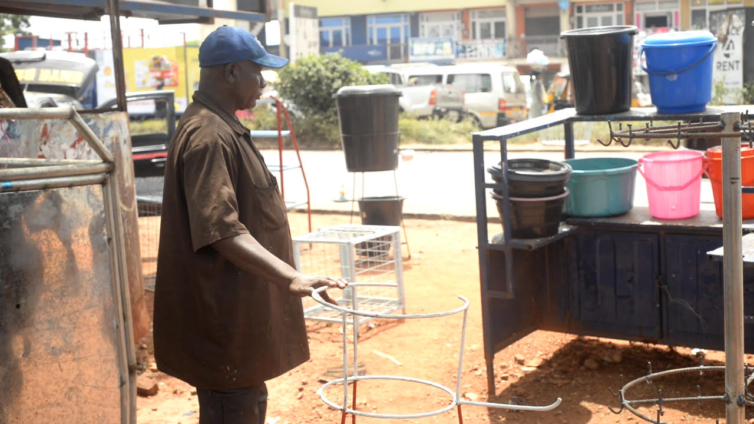At the traffic intersection at Abrepo Junction in Kumasi, steel fabricator, Philip Mensah Abgalo reviews and admires his works.
He has, for 32 years, been making racks for hairdressers, supermarkets and traders.

In 2014, Philip switched to another line of the business in the wake of the cholera outbreak.
"We’ve been in the business since the outbreak of cholera. We created stands for the buckets, which helped in the fight against the infection,” he said.
Philip recalls demand dropped after the epidemic.
“Purchases reduced and with time; nobody really asked of it again. I saw that those at the schools weren’t catered for properly,” he added.
Business saw a leap again, with the outbreak of Covid-19 pandemic.
This time around, Philip added another touch to the stands: soap tray and toilet roll holder.
“We added a bit of creativity to our work for easy sanitation and sold the Veronica bucket in addition to the stands. We added the soap tray and T-roll holders to make it comfortable for people,” he revealed.

Philip who is Zonal Chairman of the National Association of Garages had little or no idea about Veronica buckets.
The sudden and widespread demand for it saw him begin to look that way.
“Mostly, clients would buy the stand and buy the bucket elsewhere. With the knowledge I have, I decided to start making the bucket.”
Philip recorded good returns.
“People were buying in bulk and those who could not afford to make full payment had to pay half to get their stands and pay the rest later,” he said.
However, even before Covid-19 is over, there was a dip in business.
“People were not really purchasing it as they used to,” he laments.
At the Kumasi Central Market, Nana Ntiriwaa Kwafowaa sells plastic buckets.
She could sell 40 a day in the early days of confirmed cases of Covid-19 but the situation has changed.
“Within this Covid-19 period, business has been good. Before and after the lockdown, individuals and groups bought in bulk. Business was good but for some days now, the reverse is the case.”
Umar Tabsoba is a retailer at Alabar. He has been in the business for 16 years, with similar stories to tell.
“Initially, we could sell ¢2,000 worth of items a day but now we sell ¢500 or ¢600,” he laments.
Faisal Razak, a retailer at Alaba wouldn’t agree less.
“For the first week we were able to sell more than 1,000 pieces, from Monday onwards we were selling 500, 600 or 700 pieces. For now, we do not sell 2 or 3 for a day,” he said.
“After the lockdown people call for bulk purchase, individuals and the government started contracting people for the stands for donations so people had it in mind that the government is distributing it for free,” said Phillip.
Demand for tap
Veronica buckets can’t be complete without a tap. Demand for them went high.
Manufacturers had to find any sort of a tap to make a Veronica bucket.
“Taps became expensive due to the demand so it made the whole thing very expensive,” said Philip.
“In the past, we would sell one bucket 25 cedis but now it’s double the price,” he added.
“100-litre capacity used to sell for 40 cedis. During the lockdown, the price shot up because we buy taps and those who help in fixing it also take their share,” said Kwafowaa.
“The price of a veronica bucket depends on the tap that is being used,” said Faisal Razak.
“The metal tap of specification BS1010 is more durable than other types. That is what I was using initially but I’ve run out now so I had to resort to other taps,” he said.
“We use plastic tap for our veronica bucket but we no longer get them,” Umar explains.

Nigeria closed her border in August 2019 to prevent smuggling of drugs, small arms and agricultural products.
Unfortunately, prediction by analysts of reopening has so far failed.
Chairman of Nigerian Importers at Adum in Kumasi, Isaiah Chima, attributes the tap price hike to events in Africa’s largest economy.
“Bringing things outside Ghana is now not common like before due to the border closure and also the duty cost. When you add the importation cost and the duty definitely you’ll get something out of it other than that you’ll lose your capital and when you lose your capital you’re out of business,” Chima emphasised.
Retail shop operator at Adum, Ebenezer Obodai says, “With the closure of the borders Nigerians who used to bring the goods at an affordable price isn’t bringing it anymore. So those who have the taps increase the price.”
Road to self-sustainability
Hand washing is gradually becoming part of us but what are we supposed to do to keep the tradition?
“Washing of hands should not be a thing of the past, government must make sure all institutions adhere to the strict rules of washing which has to be started from the basic to higher institutions,” said Philip
He backs calls for equipping our technical and vocational institutions to enhance training, if that will happen.
“This is the time most of our technical institutions should create such products.
The tap is not anything difficult to manufacture. We can’t always depend on the Europeans,” he stressed.
A yet-to-be-published joint research report by Ghana’s public universities for 2020, reveals: “Decline in the frequent hand washing per day is likely to occur in Ghana after Covid-19.”
It has therefore become imperative, education on effective hand washing, beginning from the basic school to higher institutions.
Government will also have a role to play in making water and veronica buckets available and affordable.
These could be long-term measures for ensuring protection against infectious diseases like covid-19.
Latest Stories
-
11-member Cocoa Board inaugurated with a pledge to revive sector
5 minutes -
Abdul Salam inspired to score more after first goal for Medeama
10 minutes -
Mahama assures timely payments for Big Push contractors, unveils new expressway plan
13 minutes -
Final Frontline: Police Ladies eye maiden Malta Guinness Women’s Premier League title
17 minutes -
Lawrence Agyekum signs four year permanent deal with Cercle Brugge
28 minutes -
Three injured after explosion at vulcaniser shop in New Nkusukum
31 minutes -
Expect more good news in the mid-year budget – Mahama
37 minutes -
Super-Sub Frank Adjei strikes to earn Varnamo point
45 minutes -
Samuel Ofosu Ampofo chairs 11-Member Ghana Cocoa Board
48 minutes -
Blossom Academy brings “GROW” programme to Kumasi to expand Data Skills
1 hour -
Medeama coach Ibrahim Tanko eyes victory against Karela United
1 hour -
Brilliant PRESEC-Legon student receives full scholarship from Academic City
2 hours -
Emirates inaugurates experiential Emirates Travel Store in Accra
2 hours -
José Mujica: The philosopher-president who showed the world a better way to lead
2 hours -
Kenyans in Ghana bring the vibes: A day of games, giggles, and good times
2 hours

